新概念英语2第18课
新概念英语第二册课件Lesson18
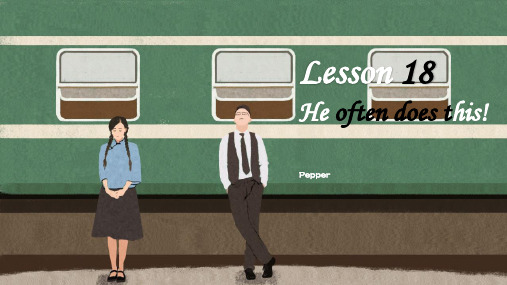
在同一范围内
Guilin is in the north of Guangxi.
to
不在同一范围内,也不接壤 Japan is to the east of China.
next to 紧靠…的旁边
The shop is next to the school.
beside 在…旁边
Come and sit beside (/by) me.
表示延续时间的介词
介词
用法
by
意为“在……之前;不迟于……”
for
意为“在……之前;不迟于……”
in
意为“在……以后;在……时间内”
since
意为“自从……以来;自……以后”
until
用于否定句中,意为“直到……才”,其前的谓语动词多为非延续性动词
用在肯定句中,意为“直到……为止”,其前谓语动词须用延续性动词
by
在…旁边,与 beside 可以互换 There is a chair by(beside) the table.
near 在…附近
There is a theatre near his home.
表示方位的介词
介词
用法
例句
around over
above
under
在…周围 在…(垂直)的正上方 抽象概念职位高低 在…(不一定垂直)的上方 职位高低 在…(垂直的)正下方
have用于“情态动词+have+过去分词”的结构,有推测、假设之意。 1.must+have+过去分词,表示对过去时间发生的动作或存在的情况 的推测,一般用于肯定句。
You must have left your bag in the theatre.
新概念英语第二册课件Lesson18共15页PPT

子男)
3.bill /bil/ n. 帐单
• 1.议案;法案 • 2.纸币;钞票 • 3.广告;海报 常用搭配: foot the bill 付账;负责 pay/settle the bill 付账 fill the bill 适合
text
• 1、After I had had lunch at a village pub, I looked for my bag.
• Pub是public house(酒店,酒店) 的缩写
• Let’s go to the pub for a drink.
• 2、I had left it on a chair beside the door and now it wasn't there!
• leave除了“离去,离开,出发” 的意思,还可以表示“把(人、 物)留下,遗留,丢下”等。
还有许多其他事要做。 • beside pron. 在……旁边,在……附近 • besides adv. 而且,并且,此外;pron. 除……
之外(还)
• I’m quite busy today. Besides, I’ve got a bad cold.
• There were a lot of people at the party besides us.
Have的用法
• 1、have作为助动词构成各种完成时和完成 进行时
• 2、have还可以作完全动词,当作“具有、 拥有”讲时,它和have got通常可以互换。 have做 “有, 患病” 概念时, 可作为实义动 词, 也可作为非实义动词。在英国英语中的 疑问句和否定句中have(具有)的用法与 be相同,即可以不用助动词do或did;在美 国英语中,常用do助动词和have一起构成 疑问句和否定句。
新概念英语第二册Lesson18课件

give A back to B 上交,交给
捐赠,赠送
2024/5/30
屈服,投降 放弃 投降
give 的短语动词
2024/5/30
在…旁边
除…之外(还有…)
A besides B 除了B,还有A B+A
except A except B 从A中除去B
A-B
2024/5/30
表示“除了”的词
Lesson 18 He often does this
酒吧,酒馆
贵族,大臣,领主,勋爵 土地
业主,房东
You must pay the telephone bill. The bill will become law next year. 议案,法案 Please bill me for the books. (v.)开账单
give A back to B 把A还给B return A to B take
2024/5/30
1. have(has/had) 在完成时中做助动词 I have already had lunch. She had cleaned the room before we came home.
2024/5/30
2024/5/30
Hale Waihona Puke 2. have可以表示“有,拥有” 此时它是一个实义动词 可以和own, possess, have got进行替换 要注意have got表示“拥有”时,其中的have相当于助动词
2024/5/30
2024/5/30
洗(澡) 吃
玩得开心 收到
3. have加名词或者名词短语 表示进行和从事与这个名词相关的事情 具体意思根据名词来翻译 have a smoke
新概念英语第二册第18课
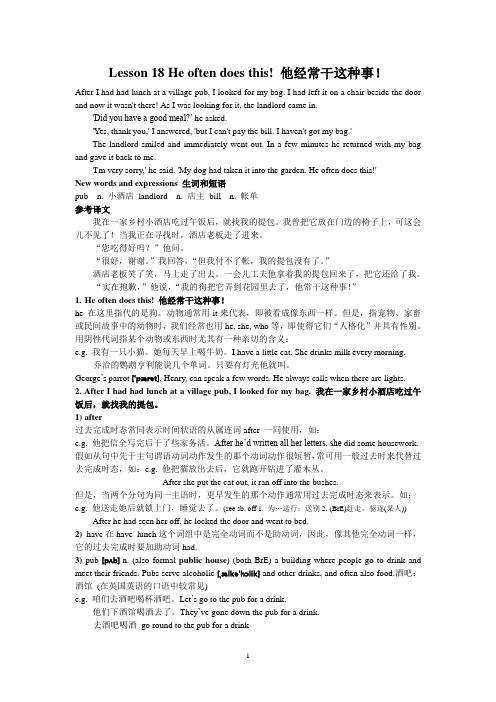
Lesson 18 He often does this! 他经常干这种事!After I had had lunch at a village pub, I looked for my bag. I had left it on a chair beside the door and now it wasn't there! As I was looking for it, the landlord came in.'Did you have a good meal?’ he asked.'Yes, thank you,' I answered, 'but I can't pay the bill. I haven't got my bag.'The landlord smiled and immediately went out. In a few minutes he returned with my bag and gave it back to me.'I'm very sorry,' he said. 'My dog had taken it into the garden. He often does this!'New words and expressions 生词和短语pub n. 小酒店landlord n. 店主bill n. 帐单参考译文我在一家乡村小酒店吃过午饭后,就找我的提包。
我曾把它放在门边的椅子上,可这会儿不见了!当我正在寻找时,酒店老板走了进来。
“您吃得好吗?”他问。
“很好,谢谢。
”我回答,“但我付不了帐,我的提包没有了。
”酒店老板笑了笑,马上走了出去。
一会儿工夫他拿着我的提包回来了,把它还给了我。
“实在抱歉,”他说,“我的狗把它弄到花园里去了,他常干这种事!”1.He often does this! 他经常干这种事!he 在这里指代的是狗。
新概念2 第18课 课件
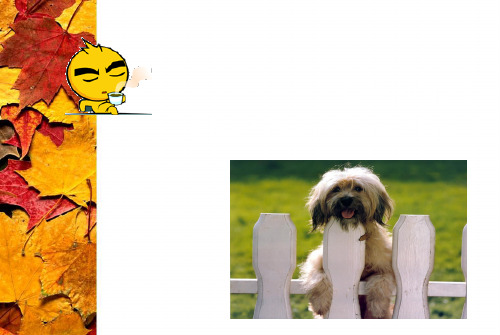
He often does this.
He/she都可用来指Pets 此外She 指 nation, mountain, river, tower, building.
I looked for my bag。 Look for 寻找(强调找的过程)
Find找到,强调寻找的结果。 e.g.我在寻找一个快速致富的方法。 I’m looking for a way to get rich quickly. e.g.嘿,你在找茬吧。 Hey, you’re looking for trouble . Can you find a football in our classroom? We are looking for it.
Lesson 18 He often does this!
1Minute Speech • Why do people have pets?
1. Like animals; • 2. lovely and beautiful; • 3. look as members of the family; • 4.go out for a walk with them; • 5.can show how rich they are; • 6.help people guide the house • 7.make family enjoyable; • 8. help person feel less lonely;
Give的几个固定搭配
Give 及物动词,后接名词作宾语。常表示“给 予”“交给” Eg. Give me the book. please give it to me. a. Give back.“归还” Give it back to me. b. Give in. “屈服” E.g. The enemy have given in to our army. Don’t give in yourself to the difficulties.
新概念英语第二册Lesson18

Lesson 18 He often does this! 他经常干这种事! First listen and then answer the question. What had happened to the writer's bag? After I had had lunch at a village pub, I looked for my bag. I had left it on a chair beside the door and now it wasn't there! As I was looking for it, the landlord came in. 'Did you have a good meal?" he asked. 'Yes, thank you,' I answered, 'but I can't pay the bill. I haven't got my bag.' The landlord smiled and immediately went out. In a few minutes he returned with my bag and gave it back to me. 'I'm very sorry,' he said. 'My dog had taken it into the garden. He often does this!'
新概念英语第二册lesson18精品PPT课件
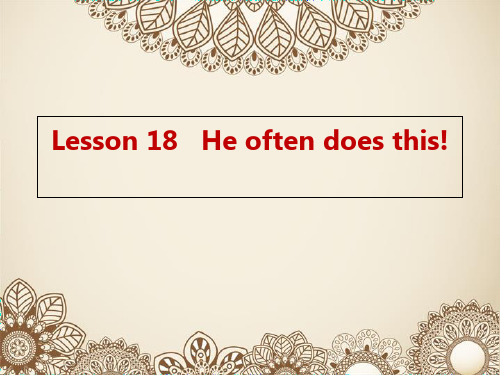
住客栈
2 landlord
(1)主人, 房东(旅馆,家庭,公寓)
(2)地主
lord n . 统治者,主人,贵族,勋爵
Lord! 天啊!哎呀!哎哟! as drunk as a lord 酩酊大醉
landlady 女主人;
3 Bill 1) n. 账单,纸币 (note)
2) n. 招贴,广告,海报
1) n. 账单,纸币 (note) pay the bill/settle the bill
付账
It’s wrong to leave a hotel without paying all your bills. 没有付账离开旅馆是不对的。
新概念第二册Lesson 18

助动词
动词
村庄
酒馆
寻找
After I had had lunch at a village pub, I looked for my bag.
I had left it on a chair beside the door and now it wasn't there!
没有
haven't got my bag. ’
一些
The landlord smiled and immediately went otes he returned with my bag and gave it back to me.
‘I'm very sorry, ’he said. ‘My dog had taken it into the
Tim has got two sisters. =Tim has two sisters.
The house hasn’t got a garden.
The house doesn’t have a garden.
1. Sarah hasn’t got / doesn’t have a car. She goes everywhere by bicycle. 2. Charles isn’t happy. He has got / has a lot of problems. 3. ‘Where’s my pen?’’I don’t know. I haven’t got/don’t have it.’
a few 修饰可数名词复数,一些,有点 few 修饰可数名词复数,否定,几乎没有 a little 修饰不可数名词 little 修饰不可数名词,否定 a lot of=losts of 修饰不可数名词&可数名次复数,相当于many/much plenty of 修饰不可数名词&可数名词复数,足够的,大量的,比a lot of 多 1.There was little food in the fridge. It was nearly empty. 2.Can I have a little milk in my coffee,please?
新概念英语第二册第18课
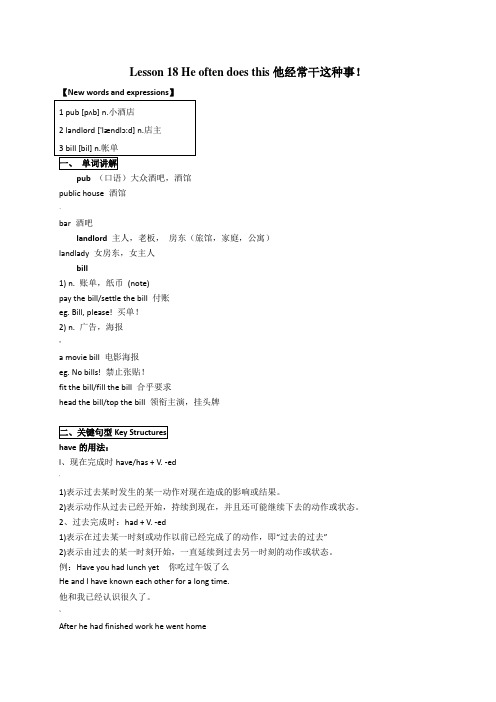
Lesson 18 He often does this他经常干这种事!【New words and expressions】1 pub [pʌb] n.小酒店2 landlord ['lændlɔ:d] n.店主3 bill [bil] n.帐单一、单词讲解pub(口语)大众酒吧,酒馆public house 酒馆、bar 酒吧landlord主人,老板,房东(旅馆,家庭,公寓)landlady 女房东,女主人bill1) n. 账单,纸币(note)pay the bill/settle the bill 付账eg. Bill, please! 买单!2) n. 广告,海报*a movie bill 电影海报eg. No bills! 禁止张贴!fit the bill/fill the bill 合乎要求head the bill/top the bill 领衔主演,挂头牌二、关键句型Key Structureshave的用法:l、现在完成时have/has + V. -ed'1)表示过去某时发生的某一动作对现在造成的影响或结果。
2)表示动作从过去已经开始,持续到现在,并且还可能继续下去的动作或状态。
2、过去完成时:had + V. -ed1)表示在过去某一时刻或动作以前已经完成了的动作,即“过去的过去”2)表示由过去的某一时刻开始,一直延续到过去另一时刻的动作或状态。
例:Have you had lunch yet 你吃过午饭了么He and I have known each other for a long time.他和我已经认识很久了。
~After he had finished work he went home他完成工作后回家了。
We had been waitiing for an hour when he showed up.他出现时,我们己经等了一个小时了。
新概念二第18课课件ppt

目录
• 课文讲解 • 练习与巩固 • 扩展与提高 • 课堂互动 • 总结与回顾
CHAPTER 01
课文讲解
词汇学习
总结词:重要词汇
详细描述:本课涉及的词汇包括“postcard”(明信片)、“envelope”(信 封)、“stamp”(邮票)等,这些词汇是日常生活中常用的,对于提高英语实 际应用能力非常重要。
话题讨论
设计与课文主题相关的话题,让学生 进行讨论或辩论,提高口语表达的逻 辑性和条理性。
写作练习
仿写练习
让学生仿写课文中的句子或段落,注重语法和词汇的准确运 用,以提高写作的基本功。
主题写作
设计与课文主题相关的写作任务,让学生进行创作,提高写 作的创意和表达能力。
CHAPTER 04
课堂互动
小组讨论
详细描述
在游戏互动中,学生通过参与各种游戏来学 习课程内容。这种方式能够让学生在轻松愉 快的氛围中学习知识,提高学习效果。同时 ,游戏互动还能够培养学生的团队协作和竞 争意识,增强学生的综合素质。
CHAPTER 05
总结与回顾
本课重点回顾
01
02
03
04Βιβλιοθήκη 掌握一般现在时的用法,了解 其与一般过去时的区别。
VS
详细描述
在角色扮演中,学生根据课程内容扮演不 同的角色,通过模拟场景来展示课程内容 。这种方式能够增强学生的参与感和体验 感,帮助学生更好地理解课程内容,提高 学习效果。同时,角色扮演还能够培养学 生的表演和表达能力,增强学生的综合素 质。
游戏互动
总结词
游戏互动是一种寓教于乐的课堂互动方式, 能够激发学生的学习兴趣和积极性。
CHAPTER 03
新概念第二册Lesson 18知识要点总结

新概念第二册Lesson 18复习要点一.L18词汇讲解:1.pub 小酒店bar 酒吧book bar 书吧/tea bar 茶吧/ internet bar 网吧ndlord 店主land 土地lord 领主Lord of Ring 指环王3.bill 账单pay the bill 付账Bill,please./Check, please.结账。
二.重难点:1.have got/has got 有/得了某种疾病,当have 或者has 的意思是“有,得病”的使用,可以互换2.give up 放弃,投降give in 投降/上交give away 送人区分give in 和give up 的不同:The soldiers lost the battle but they didn’t give themselves up . 士兵们输掉了战斗,但是他们没有投降。
The soldiers didn’t give in.士兵们没有投降。
3.a village pun 村庄的小酒馆an apple tree 一棵苹果树a woman doctor 一位女医生注意:two apple trees /two women doctors4.look for 强调动作或者过程find强调结果类比:look at/see listen to/hear put on/wear。
5.leave sb. sth/leave sth. for sb.给某人留下某物6.return的含义返回:He’ll return to his country in 2 years.他两年之后会回来。
返还,偿还:I’ll return your money soon.我会很快还你的钱。
7.几个“除......之外”的词和短语:besides/except/apart from/except fromapart from和except for 可用于句首。
新概念英语第二册第18课ppt课件

采用PP管及配件:根据给水设计图配 置好PP管及配 件,用 管件在 管材垂 直角切 断管材 ,边剪 边旋转 ,以保 证切口 面的圆 度,保 持熔接 部位干 净无污 物
• The landlord smiled and immediately went out. In a few minutes he returned with my bag and gave it back to me. 'I'm very sorry,' he said ' My dog had taken it into the garden. He often does this.'
• beside (prep.) = next to
• As I was looking for it, the landlord 采用PP管及配件:根据给水设计图配置好PP管及配件,用管件在管材垂直角切断管材,边剪边旋转,以保证切口面的圆度,保持熔接部位干净无污物 came in.
• as = when = while 当…时候 • 过去进行时:was ∕were + doing • come in = enter • 'Did you have a good meal ?' he
asked. • have a good meal
'Yes, thank you,' I answered,
'but I can't pay the bill. 采用PP管及配件:根据给水设计图配置好PP管及配件,用管件在管材垂直角切断管材,边剪边旋转,以保证切口面的圆度,保持熔接部位干净无污物 pay the bill I haven't got my bag.‘ have = have got = own = possess • The landlord smiled and immediately went out. • Immediately • = at once = right now = right away • = in no time = in a minute
新概念英语第二册lesson18

• You can do what you like. I will never give in. 4.give up doing sth. 放弃,抛弃
• He gave up drinking a few years ago. 5.give up 交出,让出
• leave除了“离去,离开,出发” 的意思,还可以表示“把(人、 物)留下,遗留,丢下”等。
• Have you left anything in the car?
I had left it on a chair beside ( 在…旁边)the door.
• Leave a.”离开””出发” • leave for sth 离开去某地 • b.把(人、物)留下、丢下、遗留等。 He will leave Chongqing他要离开重庆。 He will leave for Chongqing 他要离开去重庆
• He must be very fond of animals to have five dogs. 他一定非常喜欢动物,才会养 五条狗.
Have 的用法 (2)实义动词。拥有 have=have got
• =own,possess 拥有 • He owns a farm = He possess a
• Jack has given up the watch he stole last week. • Three of our officers gave themselves up to the enemy. 我
方的三名军官向敌人投降了。
• 3、'I'm very sorry,' he said. 'My dog had taken in into the garden. He often does this!'
新概念英语第二册18课ppt课件
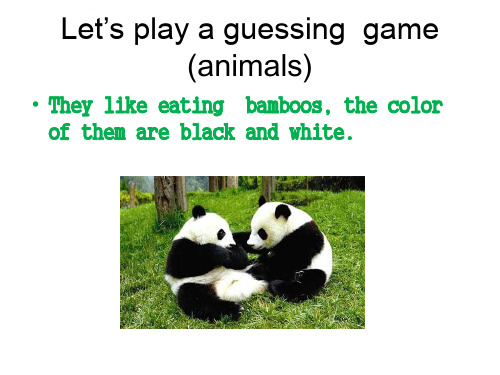
经营者提供商品或者服务有欺诈行为 的,应 当按照 消费者 的要求 增加赔 偿其受 到的损 失,增 加赔偿 的金额 为消费 者购买 商品的 价款或 接受服 务的费 用
现在完成时
• ①现在完成时 表示过去某时发生的某一动作对现在造 成影响或者是结果 I have finished reading the book .我已经读完这本书了。
过去完成时态
• ①过去完成时态表示在过去某一时刻或者动作以前已经完 成。即过去的过去。
我昨天已经完成我的作业了。 I had finished my homework yesterday . ②表示由过去的某一时刻开始,一直延续到过去另一时刻的
动作或者状态。 After he came back ,I had lived in Xiamen for 2 years .
give in =hand in 上交 投降 Though the problem is hard but I won’t give in.
give up give up smoking Do the exercise in page 82.
经营者提供商品或者服务有欺诈行为 的,应 当按照 消费者 的要求 增加赔 偿其受 到的损 失,增 加赔偿 的金额 为消费 者购买 商品的 价款或 接受服 务的费 用
• 'Did you have a good meal?" he asked. • 'Yes, thank you,' I answered, 'but I can't pay the
bill. I haven't got my bag.' • The landlord smiled and immediately went out.
新概念英语2_第18课
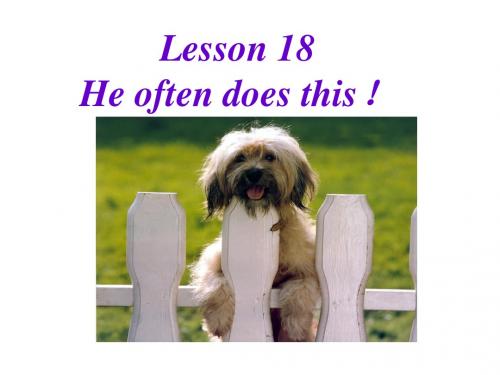
3.have可译为“拥有”=have got.但have got常用于一般现 在时,其他时态中用have. 在英式英语中,have用法与be相同,即可以不用助动词 do/does/did进行否定和疑问。 Eg: He has a pen.—He hasn’t a pen.—Has he a pen?— Yes ,he has.—No, he hasn’t.
The landlord smiled and immediately went out. In a few minutes he returned with my bag and gave it back to me. ‘I'm very sorry,’ he said. ‘My dog had taken it into the garden. He often does this!’ 1. immediately 立刻,马上 同义词:at once, instantly, right away, straight away 2. in a few minutes 几分钟后 类似的说法: in a few days in a few weeks in a few months in a few years
I had left it on a chair beside the door and now it wasn’t there! 1.leave ---left---left a.离开,出发 leave sp离开某地 leave for sp出发去某地 Eg:他要离开重庆。 He will leave Chongqing. 他要出发去重庆。 He will leave for Chongqing. b.把(人、物)留下、丢下、遗留等。 Eg: Have you left anything in the car? 2. beside: prep.在…旁边 Eg:他的汽车正停在那辆卡车的旁边。 His car is parking beside the truck.
新概念英语第二册Lesson18课件

Let’s watch a short video and find out how the dog is.
Listening Studio
ThWe lahnadtlohrda’d hs daopgpheandetdakteon tthheebwagriitnetro’thes gbaardge?n.
leave还可以作名词,表示“休假,假期”。 My best friend, Joan is spending her leave in Hawaii. 我最好的朋友琼正在夏威夷度假。
I had left it on a chair beside the door and now it wasn’t there!
I had left it on a chair beside the door and now it wasn’t there!
leave的用法
v. 离开(某处) Mr. Smith left the room at two o’clock. 史密斯先生两点离开房间的 。v. 留下;丢下;落下(常表示事物落在/忘在某处) Better take off your shoes and leave them outside. 最好把鞋子脱掉,放在外面。 v. 留给;交给(一般与介词with或to搭配) We didn’t find him and left word with his neighbour. 我们没有找到他,于是留了口信给他的邻居。
Reading Land
Read and learn.
After I had had my lunch at a village pub, I looked for my bag. I had left it on a chair beside the door and now it wasn’t there! As I was looking for it, the landlord came in.‘Did you have a good meal?’ he asked.‘Yes, thank you,’ I answered, ‘but I can’t pay the bill. I haven’t got my bag.’The landlord smiled and immediately went out. In a few minutes he returned with my bag and gave it back to me.‘I’m very sorry,’ he said. ‘My dog had taken it into the garden. He often does this!’
新概念英语第2册课件Lesson18(共18页)

• 4、In a few minutes he returned with my bag.
• →He arrived with bad news. • →He went out with an umbrella.
• My dog had taken it into the garden.
• He often does this!
came in.
• A.Because B.While C.But D.Even of
—
• 6、I haven't got a bag.I don't ____one.
• A.get B. buy C.own D.owe
• 7、My dog had taken it into the garden. It was ___ the garden.
back
Questions on the text
• 1、Where did the writer leave her handbag?
She left her handbag on the chair beside the door.
• 2、Why couldn't she pay the bill ?
The dog
She
cat
Key structures and usage.
• ※Have you got a dictionary?
‖
• Do you have a dictionary?
• ※I've got something to tell you.
•
‖
• I have something to tell you.
• A.to B. into C.at D.in
- 1、下载文档前请自行甄别文档内容的完整性,平台不提供额外的编辑、内容补充、找答案等附加服务。
- 2、"仅部分预览"的文档,不可在线预览部分如存在完整性等问题,可反馈申请退款(可完整预览的文档不适用该条件!)。
- 3、如文档侵犯您的权益,请联系客服反馈,我们会尽快为您处理(人工客服工作时间:9:00-18:30)。
pig, ham新概s念t英e语r,2第1c8课ow
Among these animals , which of them can be kept as pets?
新概念英语2第18课
Debate Do you like having pets?
新概念英语2第18课
Today we’ll listen to a story about a woman who couldn’t find her handbag.
True or false?
1.The writer had lunch at a village pub. 2.She couldn’t find her bag after her meal . 3.She could pay the bill . 4.The landlord soon found it for her. 5.The dog had taken it into the park.
1.dirty 2.waste time and money 3.carry some disease
新概念英语2第18课
Did you raise any pets? Do you like dogs as your pet?
新概念英语2第18课
When we talk about a dog, what words will you think of?
新概念英语2第18课
listen to the tape again and answer the question: What happened to the writer’s bag?
新概念英语2第18课
Answers
• At first, • the writer left it on a chair beside the door. • Then, • it was taken into the garden by a dog. • Finally, • the landlord found it and gave it back to the
‘Did you have a good meal?’ he asked. ‘Yes, thank you,’ I answered, ‘but I can’t pay the bill. I haven’t got my bag.’ The landlord smiled and immediately went out. In a few minutes he returned with my bag and gave it back to me. ‘I'm very sorry,’ he said. ‘My dog had taken in into the garden. He often does this!’
新概念英语2第18课
landlord [‘lændlɔ:d] n. 店主,地主, 房东 landlady n.女房东 Eg:我要当地主! I want to become a landlord !
新概念英语2第18课
bill [bil] 1.(大写)比尔(人名) 2.un.账单 pay the bill 付账 pay bill 工资单 Bill please !买单 Eg:比尔会替我买单的。 Bill will pay the bill for me. .海报,广告牌 show bill =poster 海报 kite bill 空头票据 Eg: 他答应带她去香港度周末的许诺不过是空头支票。 His promise to take her to Hong Kong for the weekend was just kite bill .
writer.
新概念英语2第18课
Lesson18 He often does this!
After I had had lunch at a village pub, I looked for my bag. I had left it on a chair beside the door and now it wasn’t there! As I was looking for it, the landlord came in.
Lesson 18
He often does this!
新概念英语2第18课
Let’s play a guessing game. (imal) 1.They like eating bamboos, the colors of them are black and white.
panda
新概念英语2第18课
新概念英语2第18课
Debate
Yes
No
1. lovely and beautiful; 2. go out for a walk with them; 3. help people look after the house; 4. make family enjoyable; 5. help person feel less lonely;
2.They are the symbols of Australia, and they usually put their babies in the front pockets.
kangaroo
新概念英语2第18课
Let’s have a match: Describe the animals in English, let the members of the other group guess what they are. Group A: goldfish, dog, turtle,
新概念英语2第18课
New words and expressions:
pub [pʌb] n.小酒店,酒吧 landlord [‘lændlɔ:d] n.店主,房东,地主 bill [bil] n.账单
新概念英语2第18课
pub [pʌb] n. 小酒店,酒吧 Eg:我们去酒吧喝一杯吧! Let’s go to the pub for a drink! •inn 客栈,小旅馆 •motel 汽车旅馆
